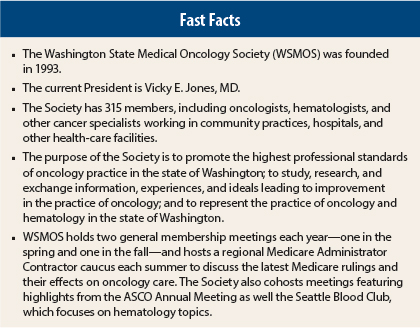The Washington State Medical Oncology Society (WSMOS) was formed in 1993 in response to the health-care reform legislation then being proposed by President Bill Clinton. “The law never passed, but it spurred the development of our Society, so some good came out of the law’s defeat,” said Vicky E. Jones, MD, President of WSMOS.
Twenty-one years later, with passage of the Patient Protection and Affordable Care Act, Washington State has led the way in successfully enrolling residents in health-care plans through the state’s insurance exchanges. WSMOS helped in that effort by providing members with educational sessions on the enrollment process of the state’s insurance exchanges.
With over 300 members, including medical, surgical, and radiation oncologists as well as physician assistants, nurse practitioners, pharmacists, and clinic administrators, WSMOS is among ASCO’s largest state affiliates. WSMOS is the largest organization in the state representing oncologists, and its members provide care for the majority of patients with cancer in Washington.
The ASCO Post talked with Dr. Jones about the Society’s current legislative activity, its unique challenges, and its goals for the future.
Mutually Positive Relationship
Why was it important for WSMOS to become an ASCO State Affiliate?
We have more than just a local vision and it is important to be part of a national structure for oncologists. Being an ASCO State Affiliate allows us to tap into ASCO’s myriad areas of expertise and also allows us to offer our expertise on a national level, so it is a positive relationship for both organizations.
Political Activity
WSMOS is among the most politically active state affiliates. Please talk about your legislative and advocacy accomplishments.
We have a long and proud history of legislative successes in helping improve the quality of cancer care in our state. Among our major accomplishments was getting the business and occupation tax that had been imposed on prescription drugs, including chemotherapy agents, repealed. The tax wasn’t uniformly imposed across all health-care facilities and mainly affected chemotherapies administered in private clinics and practices, which made it challenging for small clinics and community practices to stay solvent. Members of WSMOS testified before the Senate Committee on Ways and Means, and the law was changed to also exempt private clinics and physicians from the business and occupation tax.
We were instrumental in designing a response to a new state law regulating the handling of hazardous drugs, including chemotherapy drugs such as cisplatin, fluorouracil, methotrexate, etoposide, temozolomide, and dacarbazine in workplace settings. In 2011, Washington became the first state in the nation to adopt specific workplace safety rules to protect health-care workers against exposure to these drugs, which go into effect in 2015.
The law’s provision calls for a written inventory of hazardous drugs in the workplace, a hazard assessment, and policies and procedures such as engineering controls, safe handling practices, personal protective equipment (eg, chemotherapy gloves), spill control, and waste handling. But it is unclear how the rule will be implemented, and we are now actively involved with the State Department of Labor and Industry to formulate the details of how the law will be put into effect.
We are also currently working on refinements to Senate Bill 6016, which would address concerns about the 90-day grace period for people enrolling in our health-care exchanges and protect physicians against financial liability during the second and third months of the grace period. We have been reaching out to our members to make them aware of this bill and asking them to contact their senators responsible for this legislation about modifying that provision. I think sometimes legislators don’t understand the impact these rules have on oncologists and patient care.
Unique Challenges
What are some of your greatest challenges?
Our state’s geographic diversity is one challenge. Washington State encompasses over 71,000 square miles, and is separated by mountains and large rural and urban areas, making it difficult to provide outreach to members and address their unique concerns. WSMOS has to be mindful of all members’ concerns, including their geographic locations and how they affect the type of practice they have, whether it is hospital- or private practice–based.
Another great challenge for our members is transitioning from a state that was heavily community practice–based to one where the vast majority of the practices are now connected to a hospital partner. The issues facing the majority of our members are different now and we have had to adjust to the new challenges.
Future Goals
What are your future goals?
Our main goal is to maintain high-quality oncology care in the state of Washington, regardless of the practice setting or geographic location. One way we have been instrumental in ensuring high-quality care for our patients is the close working relationship we have established over the years with Noridian Healthcare Solutions and our other Medicare Administrative Contactors.
For example, in 2012, we worked with the Oregon Society of Medical Oncology and the Idaho Society of Clinical Oncology as well as Noridian to address the Medicare Recovery Audit Contractor audit of same-day use of pegfilgrastim (Neulasta) following chemotherapy. As a result, an article providing support for the administration of pegfilgrastim on the same day as chemotherapy was posted on the Noridian website. In addition, ASCO sent a letter to the Centers for Medicare & Medicaid Services requesting that these audits be halted. We will continue to work with Noridian and our other local carriers to help them better understand the needs of our members and our patients and to identify areas of concern surrounding Medicare audits. ■
Disclosure: Dr. Jones reported no potential conflicts of interest.



